Coffee grounds are the perfect substrate to grow mushrooms, as they contain minerals and nutritional substances useful for their growth - what may seem waste is actually a resource.
This is the idea at the base of Funghi Espresso, a start-up inspired by the ideas Blue Economy where discards from a production cycle do not become waste, but rather generate new energy, new wealth and new jobs.
"Our mission is to work in agriculture without producing waste. We employ vertical cultivation techniques to grow our mushrooms (Pleurotus Ostreatus, Pleurotus Djamor, Pleurotus Cornucopiae), thus reducing soil use: compared with traditional crops, we only use half the space to grow the same quantity of mushrooms," explains Antonio Di Giovanni (in the photo below), founder of Funghi Espresso.
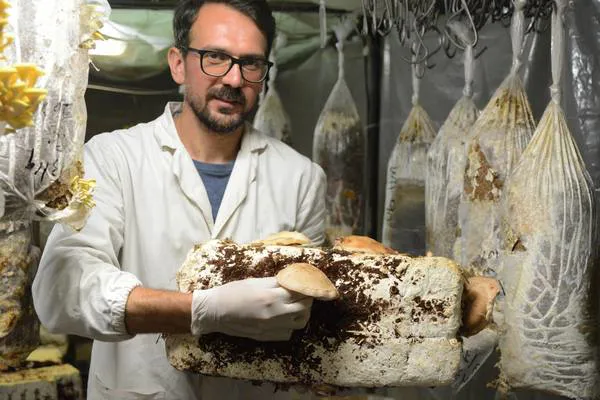
Antonio Di Giovanni.
"To obtain our substrate, we import green coffee beans that we roast ourselves. This process produces what is known as silver skin. We also collect coffee grounds from bars (around 60 kg a day, approx. a ton a month). With the addition of our silver skins, mushrooms develop the right porosity, a suitable quantity of air that enables the product to breathe. Mycelia, i.e. mushrooms seeds, are mixed with silver skins and coffee grounds creating the perfect substrate for cultivation."
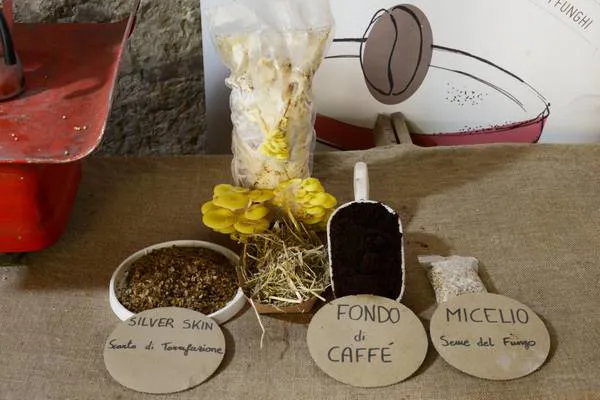
Products to create substrates.
The substrate is then placed in specific bags and left to incubate in a dark place for around 25 days. After then, the bags (which have become white) are transferred to a fructification unit, i.e. a room with 90% humidity. After approximately 10 days, the mushrooms are ready to be harvested.
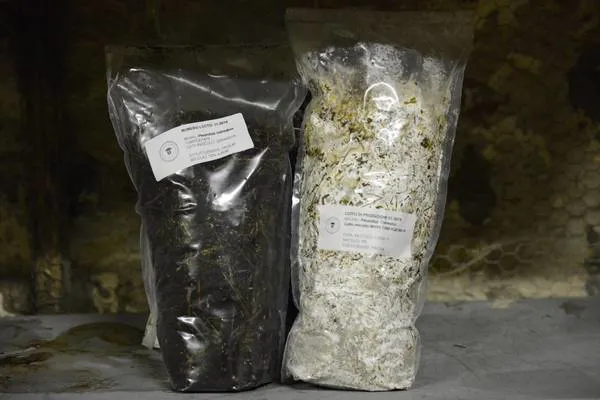
Substrate before and after incubation.
"Our mushrooms are much appreciated for their organoleptic qualities. We produce around 300 kg a month, i.e. approx. 3 tons a year. And, despite what you might think, they do not taste of coffee. From the analyses performed, though, they do contain the polyphenols present in coffee grounds, which are beneficial to our organism."
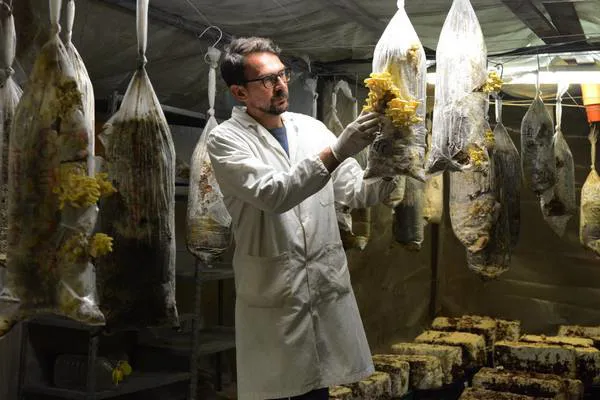
The mushrooms are commercialized via a local consumer network, ethical purchasing groups (GAS Ortofrutta), vegetarian and vegan restaurants, farmers' markets and the "L'Alveare che dice sì" network.
"The Funghi Espresso model has become part of Circular Farm, which I founded in January 2020 and where we also grow Shiitake mushrooms and produce earthworm humus."
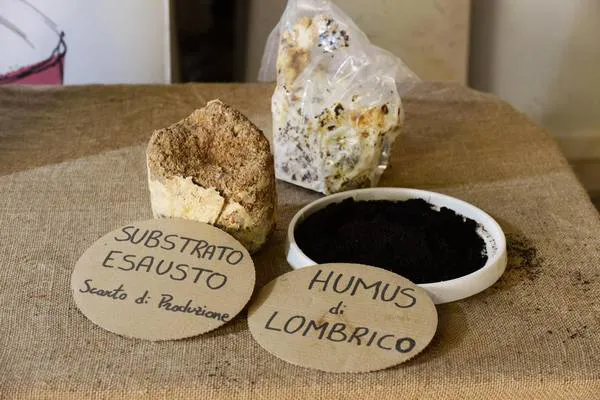
Once used, the substrate is also recycled. "We crumble it and we leave it in our composter for three months. The earthworms transform it into humus, which is then used to grow acidophilous plants."
"By growing exponentially, the earthworm population is an excellent source of protein for fish farming, so we got the idea of setting up an aquaponic system to breed koi carps and grow vegetables such as basil, tomatoes and lettuce. We also have a heated composter system where we recover the heat generated by the fermentation of organic matter and use it to heat greenhouses in winter."
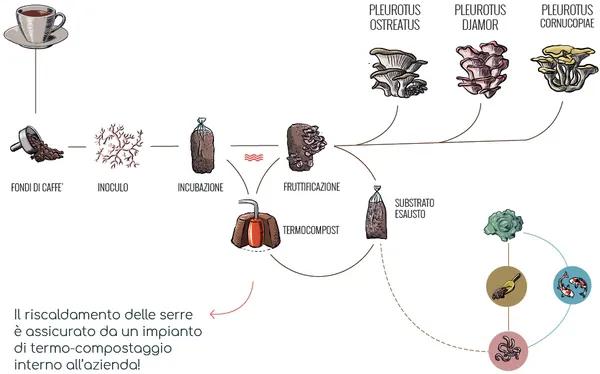
The advantages of the aquaponic system are: it saves 90% of water compared with irrigated crops; more plants per square meter; possibility of using the soilless cultivation technique in cities; using organic techniques without mineral fertilizers and insecticides; zero tillage.
Funghi Espresso kit
It is a kit for the cultivation of mushrooms from coffee ground that can be used at home. "It is easy and fun. Just open it and wet it twice a day and you will obtain the first harvest already after 7 days. With a kit, you can obtain two productions in 30 days."
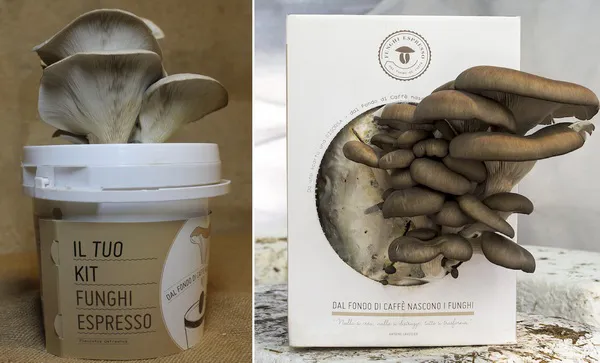
The impact of Covid-19
"The coronavirus influenced both our lives and our consumption habits. We would have never expected that bars and restaurants would be closed just like that. All of a sudden, we found ourselves without coffee grounds to collect and without our historic clients, i.e. 10 restaurants in Florence. But we have proven how small companies such as ours are very flexible and resilient. We have drastically changed the distribution and production of our products."
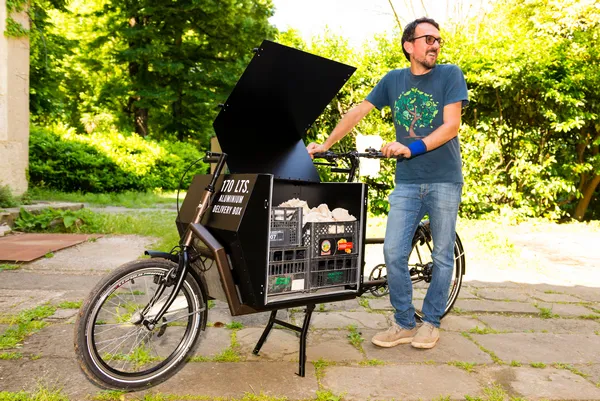
"We started delivering our products and are now working in close collaboration with purchasing groups and the Alveari di Firenze network. This way, we managed to survive during lockdown and have even widened our client network. I believe it is possible to start again after a period of crisis with a new spirit and a healthy dose of optimism."
For further information
Antonio Di Giovanni
Funghi Espresso
Email: info@funghiespresso.com
Website: www.funghiespresso.com
Circular Farm
Website: www.circularfarm.it
